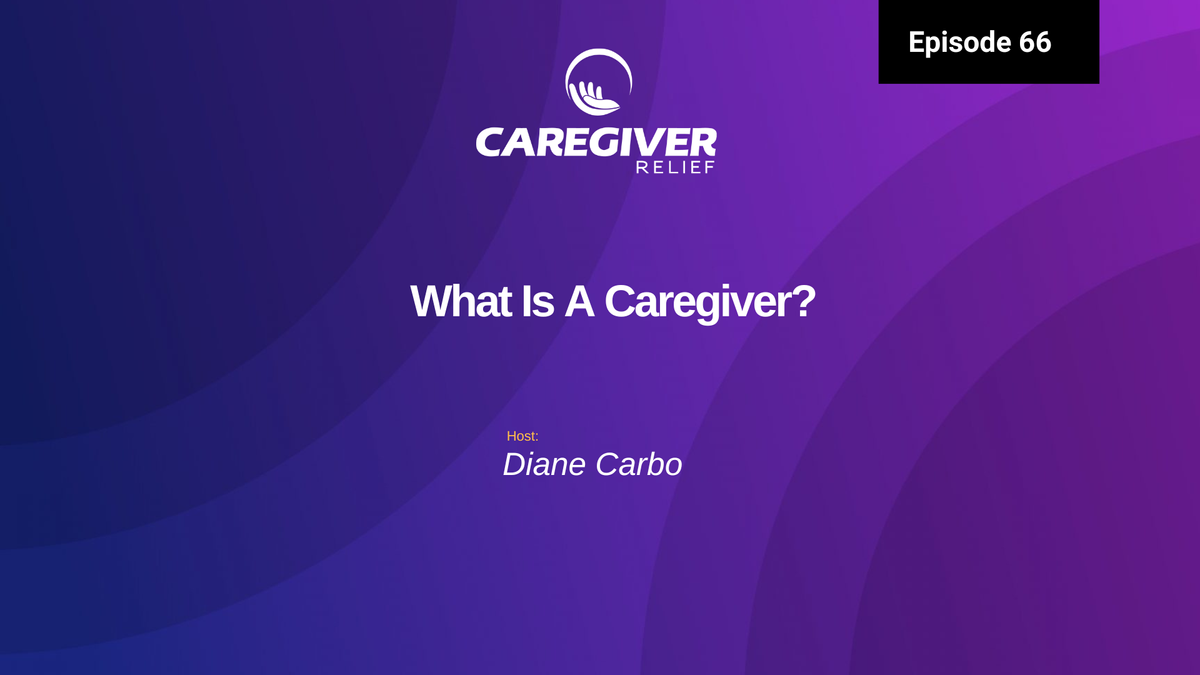Episode 66 - What Is A Caregiver?

Hi, I'm Diane Carbo, RN with Caregiver Relief. Today's topic is what is a caregiver. I'd like to start this topic with a quote from former Lady Rosalynn Carter.
There are only four kinds of people in this world, those who have been caregivers, those who are currently caregivers, those who will be caregivers, and those who will need caregivers. Caregiving is universal. The Miriam Webster dictionary defines a caregiver as a person who provides direct care for children, elderly people, or the chronically illed.
So caregiver is a general term. To me, it means anyone that supports someone that needs some extra help. This could be a family caregiver, a home, a health aide, a respite caregiver, a travel companion, a companion, or a sitter. You see, in today's world there are many that need help of some kind, and many are stepping up to the plate and providing that support.
And that support comes in many shapes, sizes, and forms. Did you know that there are over more than 65 million Americans providing care for a chronically ill disabled or senior family member, or a family member by choice during any given year? These caregivers spend an average of 20 hours per week providing support for their family member in a variety of different ways.
Yet so many do not identify as a caregiver. So I want to talk about the different types of caregivers. There are caregivers that I call care team partners. They are individuals that support the person needing care, but they're also there to support the primary caregiver.
That's really a key. These care team partners are outside professional caregivers. They can become home health aide, there are behavioral health aide. The person that takes someone to church or to the doctors or the store because they can no longer drive, is a caregiver and a care team partner. The pet walker, the Meals on Wheels volunteer. They are caregivers and care team partner. The importance of caregivers is vital to our present healthcare system. Our present system heavily depends on the family caregiver to be part of the healthcare team. They are one leg of the healthcare system.
The second leg of our healthcare system is the professional caregivers. There's the doctors, the nurses, the therapists to just mention a few. These are the individuals that are core to the success of the care team.
The third leg of the stool and the most important part is the patient or the person that needs the support and care? The present healthcare system is moving towards a person-centered approach to care. This is important as the patient or the designated healthcare power of attorney drives the team to honor the wishes of the patient.
If you want to learn more about person-centered profile, visit caregiverrelief.com and put person-centered profile in the search bar. I have added an extra leg to the healthcare stool. That is the role of a care team partner. I want to share why I think care team partners are crucial to our present healthcare system.
If one of the legs of the stool breaks, it all falls apart. Case in point, when I started caregiver relief over 20 years ago, the statistics for the family caregiver were grim. Back then, 50% of family caregivers actually became seriously ill or died before the person they were caring for pass. Today, those statistics are even more alarming.
Those statistics have increased to 63% of family caregivers become seriously ill or die before the person they're caring for passes or dies. Chronic stress, caregiver stress kills. That is why I have identified care team partners. As a group of caregivers, we must start to depend on as we face this serious crisis.
For the first time globally, we are seeing more seniors, the growing aging population far outnumbers our youth. To survive this dilemma, we need to get very creative in the way we approach care, and we as a country need to encourage and support a sense of volunteerism. We need to encourage faith-based organizations to step up to the plate and support the aging population.
I've had a talk. I'm going to be honest. I have a hard time with most faith-based organizations, many faith-based organizations, churches, if you will, have taken the tithing from their elderly church members for decades. And then when the seniors need help and support, there is very little support or even caring from the church members and leaders of the church.
So if you find my comments offensive I can't apologize. I have so many clients that have expressed this sentiment to me. I have personally witnessed this many times. There are so many churches or faith-based organizations that are doing nothing or very little to support their aging population.
That is why the concept of care team partners is such an important one. Without all four legs, our healthcare system falls apart, or it is definitely not as effective in providing the much needed care so many seniors need. As we face this growing crisis, the first step is to help identify what constitutes a caregiver. I understand your skepticism about why it's so important, knowing what is a caregiver.
So many things that make you a caregiver are things that are just natural that we do to support and provide help to those that need it. When you understand and identify yourself as a caregiver, it gives you a different perspective. You can take steps to access education and support, and even volunteer in the future for others that need care.
It also helps you provide quality care and focus on taking care of yourself. Caregivers are encouraged to practice stress management techniques, practice self care every day, join support groups that provide emotional and even disease specific support as your care recipient requires additional support.
When you identify as a caregiver, as you learn about the needs of your care recipient, you can help plan for their future care needs. And it's also time to discuss the difficult subjects such as legal paperwork, to get it in order and discuss end of life issues. So please take the quiz below to determine if you are a caregiver.
Do you currently provide support such as cleaning yard work, pet care, or laundry for a family member or friend, do you regularly cook or provide food or grocery shopping for someone? Do you help a friend or family member by picking up their medications or are you reminding him or her to take their medications?
Does your family member or friend call you nearly every day with a question or a problem or a concern? Do you drive a friend or adult family member to doctor's appointments, shopping trips, church or errands? Are you monitoring a family member or friend's medical conditions?
Are you communicating with healthcare providers on their behalf? Are you advocating or doing research on their behalf with providers or agencies or resources? Are you helping him or her out of a chair, car or bed? Are you monitoring their finances?
As you're helping your family member forced you to miss days of work, take a reduced work schedule, or even considered early retirement? Do you call on behalf of a family member or friend to ask a question about a bill or to clear up confusion about a product or service? Are you feeling stressed by the additional responsibilities that you have taken on to help?
Are you unable to take part in hobbies or recreational activities because of the time spent caring for another? If you answered yes to any of these questions, you are a caregiver or maybe a person that would benefit from support@caregiverrelief.com.
I'm Diane Carbo, RN with Caregiver Relief. If you were a family caregiver, you are the most important part of the caregiving equation. Without you, it all falls apart. So please learn to be gentle with yourself, practice self care every day because you are worth it.
You might also like this article:







